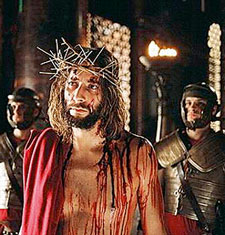The Visual Bible's presentation of the Gospel of John is probably one of the best cinematic presentations of Jesus available today, but its problems are those that relate directly to its topic matter.
Henry Cusick is a credible Jesus who handles the subtleties of the Gospel of John well. The narration by Christopher Plummer is also excellent and, given that it confines itself largely to the text of the Gospel, the Biblical content is first-rate. Some will quibble at the use of the Good News translation, however simplified texts are an essential ingredient for visual mediums where pictures have the potential to obscure as much as build meaning. That is unlikely to occur here, though.
 The visual components of The Gospel of John are probably the best I have seen in numerous productions of Jesus' life. Significant attention has been paid to the historical accuracy of costuming and settings. Realistic digital compositing also does a great deal to bring the world of first century Palestine to life. If there are concerns, they relate most to the actors. Some of the bigger scenes in Jesus' life, such as he clearing of the Temple and the feeding of the five thousand, underwhelm because of the lack of extras involved. Also, as always, there seems to be an oversupply of Caucasians playing Middle Eastern characters, and despite the cutting edge computer generated images, it appears that false beard technology hasn't moved on much further than The Life of Brian.
The visual components of The Gospel of John are probably the best I have seen in numerous productions of Jesus' life. Significant attention has been paid to the historical accuracy of costuming and settings. Realistic digital compositing also does a great deal to bring the world of first century Palestine to life. If there are concerns, they relate most to the actors. Some of the bigger scenes in Jesus' life, such as he clearing of the Temple and the feeding of the five thousand, underwhelm because of the lack of extras involved. Also, as always, there seems to be an oversupply of Caucasians playing Middle Eastern characters, and despite the cutting edge computer generated images, it appears that false beard technology hasn't moved on much further than The Life of Brian.
Probably the greatest concerns with this production relate to the Gospel itself - there are, after all, some books that just might not work as films. John is a very difficult Gospel to tackle because of the complexity of the Jesus it presents. Of all the Gospels it is probably the one that requires the most study to be understood. This in turn requires a great deal of the director, the scriptwriter and the actors who are charged with containing such complexity in a three-hour production. The majority of the scenes are handled well but a certain degree of confusion was probably inevitable. For example Jesus' conversation with Nicodemus about being 'born again' gives the impression that no-one knows what Jesus is saying, except that he has something very profound to convey about Heaven. Also the pivotal Chapter 8 in which Jesus reveals his divinity in the Temple will probably perplex because the viewer cannot be expected to be aware that Jesus using the term 'I am' is synonymous with him declaring himself to be God.
Cusick's Jesus often comes across as loving and sincere but incomprehensible to his listeners - which may be entirely appropriate given his disciples' failure to understand his true mission till after the resurrection. But that confusion will hardly be helpful to someone inquiring into the Christian faith. Where this production does excel, though, is in the way it conveys the determination of the Son of God. This is no mere social saviour. Cusick ably portrays a Jesus who will not be diverted from declaring and carrying out the purposes of God. Furthermore, no-one could watch this production without coming away with the clear impression that Jesus considered himself the actual son of God. Furthermore, there is no doubt that Jesus' resurrection was a physical one though Mary Magdalene's experience of the risen Christ seems to be a highly spiritualised one.
Given its limitations, The Gospel of John is not the sort of film that you could confidently hand to a non-Christian to watch on its own. But watched in the context of informed discussion, it provides a stirring portrait of the Son of God.
























